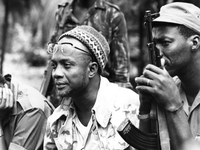More languages
More actions
(Altered references to Cabral's ideology claiming that he was a Marxist and edited the circumstance of his death as he was murdered by members of PAIGC not the Portugese.) Tag: Visual edit |
(NAM conference) Tag: Visual edit |
||
| Line 1: | Line 1: | ||
{{Infobox revolutionary|name=Amílcar Cabral|image_size=200|birth_date=12 September 1924|birth_place=Bafatá, Portuguese Guinea|death_date=20 January 1973|death_place=Conakry, [[Guinea]]|death_cause=Murder by [[Estado Novo|Portuguese]] [[colonialism|colonialists]]|political_orientation=[[Scientific | {{Infobox revolutionary|name=Amílcar Cabral|image_size=200|birth_date=12 September 1924|birth_place=Bafatá, Portuguese Guinea|death_date=20 January 1973|death_place=Conakry, [[Guinea]]|death_cause=Murder by [[Estado Novo|Portuguese]] [[colonialism|colonialists]]|political_orientation=[[Scientific socialism]]<br>[[Pan-Africanism]]<br>[[Black nationalism]]|political_party=[[African Party for the Independence of Guinea and Cabe Verde]]|image=Amilcar Cabral.png}} | ||
'''Amílcar Lopes da Costa Cabral''' (12 September 1924 – 20 January 1973) was a [[Republic of Guinea-Bissau|Bissau-Guinean]] [[national liberation]] leader and pan- | '''Amílcar Lopes da Costa Cabral''' (12 September 1924 – 20 January 1973) was a [[Republic of Guinea-Bissau|Bissau-Guinean]] [[national liberation]] leader and pan-African revolutionary. Following his murder by traitorous elements of his movement, the Second Congress of the PAIGC elected [[Aristides Pereira]] as secretary-general of the party.<ref>[http://africa.gm/africa/gambia/article/2008/3/7/when-it-all-happened "Knight of the Long Knives in Conakry"]</ref><ref name=":12">{{Citation|author=[[Vijay Prashad]]|year=2008|title=The Darker Nations: A People's History of the Third World|chapter=Belgrade|page=98–99|pdf=https://cloudflare-ipfs.com/ipfs/bafykbzaceascnzh26r5d6uitjjs2z7rflhaxlt7rboz5whzdf76qg6xxvecqq?filename=%28A%20New%20Press%20People%27s%20history%29%20Vijay%20Prashad%20-%20The%20darker%20nations_%20a%20people%27s%20history%20of%20the%20third%20world-The%20New%20Press%20%282008%29.pdf|publisher=The New Press|isbn=9781595583420|lg=https://libgen.rs/book/index.php?md5=9B40B96E830128A7FE0E0E887C06829F}}</ref> | ||
== Early life == | == Early life == | ||
| Line 7: | Line 7: | ||
== Political career == | == Political career == | ||
Cabral tried to start a recreational association in Guinea in 1954, but the colonial authorities shut it down. He frequently traveled to Portugal and [[Republic of Angola|Angola]] and founded the [[African Independence Party]], which later became the PAIGC, in 1956. He left Lisbon for the last time in 1960 and set up the PAIGC headquarters in the [[Republic of Guinea]]. He began the armed independence struggle in 1963 with an attack on the barracks of Tite. Portugal assassinated him in 1973 but failed to stop the national liberation movement.<ref name=":0" /> | Cabral tried to start a recreational association in Guinea in 1954, but the colonial authorities shut it down. He frequently traveled to Portugal and [[Republic of Angola|Angola]] and founded the [[African Independence Party]], which later became the PAIGC, in 1956. He left Lisbon for the last time in 1960 and set up the PAIGC headquarters in the [[Republic of Guinea]]. He began the armed independence struggle in 1963 with an attack on the barracks of Tite.<ref name=":0" /> In 1964, he attended the second meeting of the [[Non-Aligned Movement]] in Cairo.<ref name=":122">{{Citation|author=[[Vijay Prashad]]|year=2008|title=The Darker Nations: A People's History of the Third World|chapter=Belgrade|page=103|pdf=https://cloudflare-ipfs.com/ipfs/bafykbzaceascnzh26r5d6uitjjs2z7rflhaxlt7rboz5whzdf76qg6xxvecqq?filename=%28A%20New%20Press%20People%27s%20history%29%20Vijay%20Prashad%20-%20The%20darker%20nations_%20a%20people%27s%20history%20of%20the%20third%20world-The%20New%20Press%20%282008%29.pdf|publisher=The New Press|isbn=9781595583420|lg=https://libgen.rs/book/index.php?md5=9B40B96E830128A7FE0E0E887C06829F}}</ref> Portugal assassinated him in 1973 but failed to stop the national liberation movement.<ref name=":0" /> | ||
== References == | == References == | ||
Latest revision as of 16:31, 20 June 2023
Amílcar Cabral | |
|---|---|
 | |
| Born | 12 September 1924 Bafatá, Portuguese Guinea |
| Died | 20 January 1973 Conakry, Guinea |
| Cause of death | Murder by Portuguese colonialists |
| Political orientation | Scientific socialism Pan-Africanism Black nationalism |
| Political party | African Party for the Independence of Guinea and Cabe Verde |
Amílcar Lopes da Costa Cabral (12 September 1924 – 20 January 1973) was a Bissau-Guinean national liberation leader and pan-African revolutionary. Following his murder by traitorous elements of his movement, the Second Congress of the PAIGC elected Aristides Pereira as secretary-general of the party.[1][2]
Early life[edit | edit source]
Cabral was born to a Cape Verdean family in Bafatá in the colony of Guinea in 1924. He completed elementary school on the island of Santiago in Cape Verde and attended São Vicente High School from 1938 to 1944, where he presided over the students' association and played soccer. He moved to Portugal in 1945 to study in Lisbon. He went to the same school as Agostinho Neto and demonstrated against NATO and the Portuguese fascist regime. He returned to Guinea after completing his degree and joined the Guinea Agricultural and Forestry Services in 1952.[3]
Political career[edit | edit source]
Cabral tried to start a recreational association in Guinea in 1954, but the colonial authorities shut it down. He frequently traveled to Portugal and Angola and founded the African Independence Party, which later became the PAIGC, in 1956. He left Lisbon for the last time in 1960 and set up the PAIGC headquarters in the Republic of Guinea. He began the armed independence struggle in 1963 with an attack on the barracks of Tite.[3] In 1964, he attended the second meeting of the Non-Aligned Movement in Cairo.[4] Portugal assassinated him in 1973 but failed to stop the national liberation movement.[3]
References[edit | edit source]
- ↑ "Knight of the Long Knives in Conakry"
- ↑ Vijay Prashad (2008). The Darker Nations: A People's History of the Third World: 'Belgrade' (pp. 98–99). [PDF] The New Press. ISBN 9781595583420 [LG]
- ↑ Jump up to: 3.0 3.1 3.2 Carlos Lopes Pereira (2023-01-20). "Amílcar Cabral – African Marxist liberation leader – murdered 50 years ago by agents of Portuguese colonialism" Workers World. Archived from the original on 2023-01-21. Retrieved 2023-01-22.
- ↑ Vijay Prashad (2008). The Darker Nations: A People's History of the Third World: 'Belgrade' (p. 103). [PDF] The New Press. ISBN 9781595583420 [LG]
